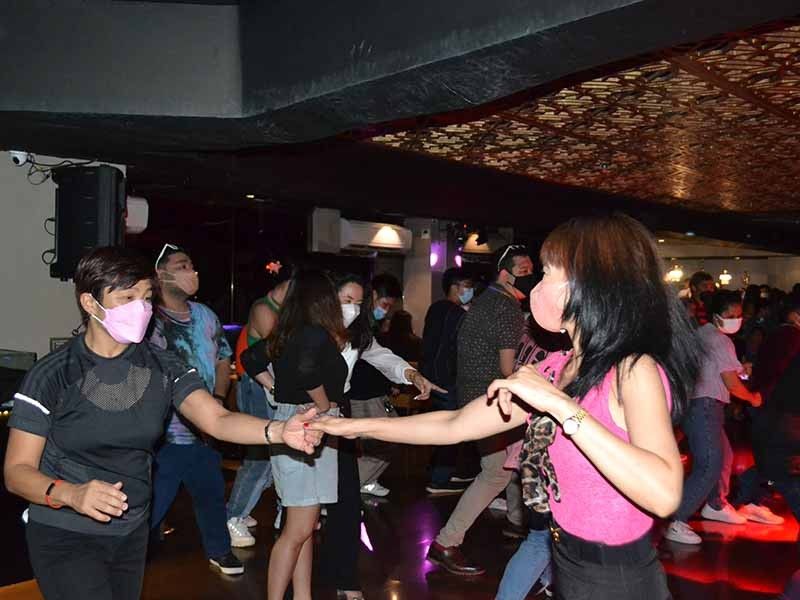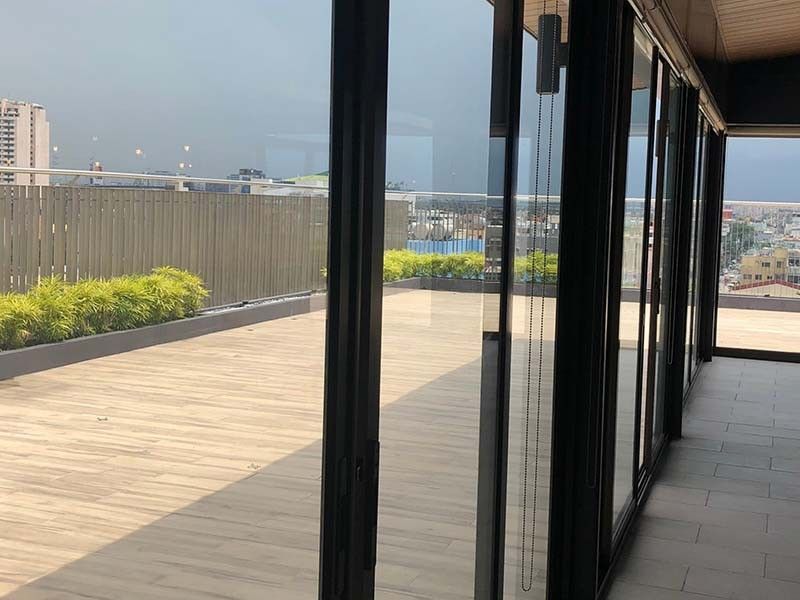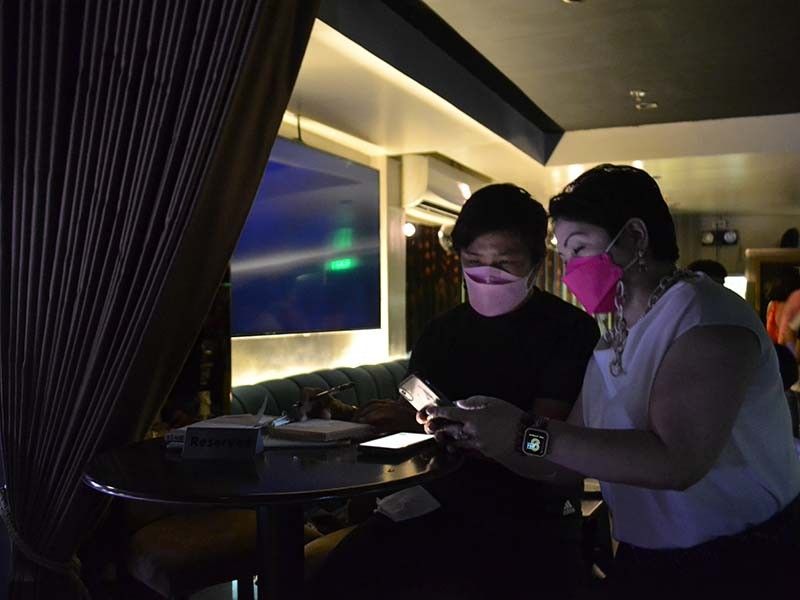‘The right place for us’: Reviving Manila’s lesbian spaces

Enterprising Filipino queer women are attempting to revive women-centric queer safe spaces in Manila that disappeared in the late 2000s. Perceived low profitability in courting a majority lesbian market, as well as cultural expectations on Filipino women, have made this an uphill battle.
MANILA, Philippines — It was Pauline’s* first night out again in a long time. It just didn’t go as planned.
Wanting to reunite with high school friends after COVID restrictions lifted, the 24-year-old lesbian — who out only to a small number of queer friends — caught up with her gay male friends in a cocktail bar known to be frequented by single heterosexual men in a popular entertainment district in Manila.
Pauline thought she was in for a night of fun. But when a guy approached to ask for her number, her drunk friend laughed and said: "Oh, she only likes bilat (a vulgar Filipino word for vagina)!"
Pauline felt as if she was outed to a stranger against her will in a place where she was uncomfortable to begin with.
"I felt mocked. To reduce lesbians to just being vagina-lovers was wrong," Pauline said, adding that this was the last time she spent a night out with those friends. "It was my first time feeling trivial for being a lesbian."
Surrounded by drunk men, Pauline said she couldn’t muster the courage to tell her friend off and "cause a scene" at the bar.
"I think that’s something that queer women like me have to solve together," Pauline said. "It felt like at that moment, in the face of discrimination, I had to passively accept it. [If I were] with other women, I think it would have been different."
At least 11 Filipino women interviewed for this story who identify either as lesbian or bisexual said the absence of physical spaces that cater specifically to queer women in Metro Manila have pushed them to deal with misogynistic remarks and sexual harassment from men of various sexual orientations. Others have shared their discomfort with the fetishization of their sexual identity in their quest to find a community.
Struggles in being a Filipino queer woman
Queer women like Pauline have often had to repress their sexual identity until their working years to avoid discrimination in a predominantly and nominally Catholic country that tolerates — but does not yet completely accept — them.
57-year-old lesbian writer Giney Villar, who used to host gatherings for working lesbian women in her restaurant in Manila, said she organized these events because she found that lesbian women struggled to find queer women friends at work, especially in traditional male-dominated corporate environments.
"[I remember] a lesbian guest who approached me [after my event] saying, ‘Thanks for inviting me. I forgot I was a lesbian,’" Villar recalled.
"I kept thinking, how could you forget something like that? She forgot that this was an important part of herself that she wasn’t able to take care of," Villar added. "The system just eats you up."
Another young queer woman interviewed said that on her first date with her girlfriend in a mall, she "felt funny" giving her girlfriend a rose that she had hidden inside a bag.
"I only managed to tell [my girlfriend] about it [when we got inside] the cinema because it was already dark," she said. "It would have been nice if we had a place where we didn’t have to hide."
In the absence of physical recreational spaces — such as clubs, bars, cafes and parks — for queer women, one young lesbian woman said that her attempts to find lesbian communities online inadvertently exposed her to adult-rated videos of lesbian women on pornographic websites. "Lesbian" was one of the most popular categories on adult websites globally in the last 10 years.
Cultural expectations
Around the world, lesbian bars have faced a hard time staying in business. The Philippines is no different. While there exists no official data on the number of queer women-centered establishments in the Philippines that have closed since the 1980s, three popular lesbian bars — La Dida, Powerstation and Third Dimension — have closed since the late 2000s.
Smaller lesbian bars and discos that used to operate in hotel basements or other pockets of Manila have also shut down.
One of the reasons cited by queer women business owners is that women tend not to spend as much money on leisure activities — such as going out at night — as men. Coupled with the heavy cultural expectations imposed on Filipino women to stay at home and take care of the household, this makes opening a business exclusively for women something of a business no-brainer.
Filipino lesbian women are charting a "very challenging space" in businesses, said Angel Romero of the Philippine LGBT Chamber of Commerce, the first organization for LGBTQ businesses in Asia.
"Nowadays, lesbian women’s voices are being drowned out," Romero said. "We’re just used to a male-dominated society."
Inside a popular gay bar in one of Manila’s high-end districts, three lesbian women have been hosting "Girl Nation" — a women-centered party that features queer women performers — since 2016.
These queer women organizers are looking to fill the void of long-gone lesbian bars. "Our main goal is to make a home for the LGBTQ community," one organizer who requested anonymity told us.
The organizers used to hold the event every Tuesday but in 2018, after taking lower profits than the bar’s nights for men, the management of the bar decided to hold the event once a month instead. Empty tables and women going home early at midnight were some of the reasons they cited.
The party organizers crunched the numbers themselves and estimated that only a quarter of the gay bar’s usual crowd went there on the lesbian-themed nights. They agreed to run the night just once a month.
"Our parties are drawing in larger crowds, especially after the pandemic. Queer people got more excited to go out," the Girl Nation organizer said. "The guests would fill the bar’s second floor, with more guests walking in the venue."
But despite the popularity of the monthly lesbian nights, it didn’t make financial sense to return the night to the weekly event it once was. Now the club’s regulars have even fewer opportunities to spend time somewhere they feel protected from unwanted sexual advances — a persistent problem in Manila’s nightclubs and bars.
Business challenges for queer women
Since 2019, architect Lara Diaz has been planning to open one of the first female-exclusive lounges in Metro Manila. Finding it hard to meet other Filipino queer women, Diaz and her female partner conceptualized Ámame Lounge to be a rooftop speakeasy that would bring queer women together.
Without a safe venue for queer women to meet, Diaz said that this deprives them of a sense of community and belongingness. "You feel like you’re floating in a sea of people, and you feel like you don't belong. You only feel [the community] once a year during Pride March."
Diaz had trouble finding investors for the exclusive female lounge. She estimated that for every 10 people she pitched the business proposal to, only two were excited about the idea. Others would tell her they weren’t "open to investing in this industry."
Diaz, who is studying for a masters degree in one of Asia’s best business schools, said that she lacked connection to a network of queer women who could invest in the women-centered business.
"I know that there are queer people who are loaded. It’s just that I don’t know who they are. I haven’t met them. I don’t have contacts with them," Diaz said.
Compared to men, women in the Philippines tend to have less access to capital and credit due to having fewer assets to their name, says a 2017 report by international law firm White & Case. The report also cited a lack of information and time devoted to imposed domestic duties as one of the reasons there are less women than men in business in the country.
Diaz did find willing investors after months of searching. But challenges in securing a financially viable contract stalled the lounge’s opening in August 2019 after the male landlord unexpectedly increased the rent by 30% and added a three-year lock-in period of tenancy, on the same day of the contract signing.
Diaz said that the costs would have led to their “financial ruin.”
"At the end of the day it is a business. It has to be sustainable, it has to stand the test of time. The vision… it’s all going to waste if we close down after five years," Diaz added.

Ámame Lounge, which architect Lara Diaz touted could have been one of the first exclusive lounges for women in Manila, has yet to find a new place after their first landlord drew up apparently unreasonable terms. Diaz said the rooftop location was “almost perfect.” Photo by Lara Diaz
'Not after the profit '
Bunny de Leon, a lesbian woman who co-owns Studio Dance Club, a basement disco club in a popular business district in Manila, prefers to keep her bar open to people of all sexual orientations.
Studio Dance Club opens their dance floor with ballroom, swing or disco music and de Leon is usually the first one on the floor. "I’m always part of the first dance to show people they can dance with the same sex," she said.
Once a month, de Leon hosts a women-exclusive event called Buttercup, where Filipino queer women in their 50s and 60s dance to their generation’s hit music.
"Our sales for Buttercup are not very high," de Leon said, adding that the exclusive event would typically draw less than half their usual crowd compared to their regular nights — around 70 of their maximum 200-people-capacity. "I’m really supportive of the community. I’m not after the profit, as long as we don’t incur a deficit," she said.
As a bar owner, de Leon believes that reviving the lesbian community was always going to mean foregoing profit. However, de Leon said they might hold their future Buttercup events once a quarter so that she can break even on the costs of running the bar.
"In the Philippines, people are still a bit narrow-minded, and we really need more safe spaces. That’s the history of why we started this club," she said. "I wanted to dance [with a woman] without being judged."

Bunny de Leon and her business partner say that Studio Dance Club’s reputation as a queer women-friendly space is a happy accident, as they notice more women flocking to their regular nights. Photo by Cristina Chi and Jan Cuyco
Cultural barriers
Villar said that the perceived low profitability in an establishment that caters solely to queer women is deeply tied to domestic expectations for women.
"It’s considered culturally acceptable for Filipino men to have fun and unwind [at a bar] after work, but it’s a different story for Filipino women," Villar said. "They either have to help their mothers at home or they have to work more."
This cultural expectation drives lesbian, bisexual and transgender Filipino women to devote a large portion of their earnings to household income, which they see as a way of gaining their family’s acceptance in line with traditional Filipino values, according to a 2015 study by GALANG, a Filipino lesbian non-profit organization.
Queer Filipino women’s financial obligations may also lead almost half of them to "frequently worry about being able to financially support their dependents" despite working full-time jobs, according to a 2020 United Nations Development Programme (UNDP) report.
"There just aren’t enough women who would readily burn through P2,500 every night at a bar," Villar said. In Manila, the daily minimum wage is P537, around the same price of the typical door charge at a bar.
Alternatives to bars
Queer women need more diverse options for safe spaces, said Villar, preferably ones that cater specifically to their preferences. Bars and clubs, for example, can be prohibitively expensive and many people outgrow them with time.
"It’s important that when you create a space, people are consulted. Women are culturally trained to restrain themselves — you don’t talk, you don’t claim space," Villar said.
While nightlife establishments have historically carved safe spaces for queer people around the world, they still only cater to one sector of an ever-growing LGBTQ community. According to Villar, a broadening movement of LGBTQ acceptance in the Philippines should allow queer Filipino women to feel safe even outside of exclusive bars.
"All spaces should be considered queer safe spaces, not just [parties] every Saturday night. It’s not supposed to be like that," Villar said. "Otherwise [queer women] would just be looking from the outside and trying to fit into that. We need a space to know ourselves, to create the right space for us."
In 2022, South Korea saw an uptick in women-only establishments, from study cafes, gyms, dormitory-style flats and guest houses, as women fear becoming targeted by voyeurism, stalking and rape, among other gender-based crimes.
Filipino women continue to live with the threat of gender-based violence. National police recorded a total of 12,524 cases of Violence Against Women in 2021, with cases in the nation’s capital second highest among 17 regions in the Philippines.
The Philippines also ranks as the third most dangerous country for women in the Asia Pacific region in terms of legal protections against violence and quality of life, according to a 2019 study by research-based company ValueChampion.
A bill penalizing gender-based discrimination has been languishing in Congress for two decades. At least 24 local jurisdictions have enacted anti-discrimination ordinances against members of the LGBTQ community as of 2017, but the absence of a national law makes implementation uneven.
After experiencing an unsavory incident at a bar, Pauline said that her idea of a safe space is a queer women-exclusive library or book club in Manila where women can meet and have access to media and literature with lesbian representation.
"Why not have a safe space for queer women where people are not focused on drinking alcohol and finding sexual intimacy?" Pauline added. "If more lesbians get together and find time to express themselves freely, that would be so good for us."
--
Note: The name of the interviewee has been changed due to the sensitive nature of her experience.
This story was supported with funding and training by the Friedrich Naumann Foundation for Freedom.
- Latest
- Trending

































